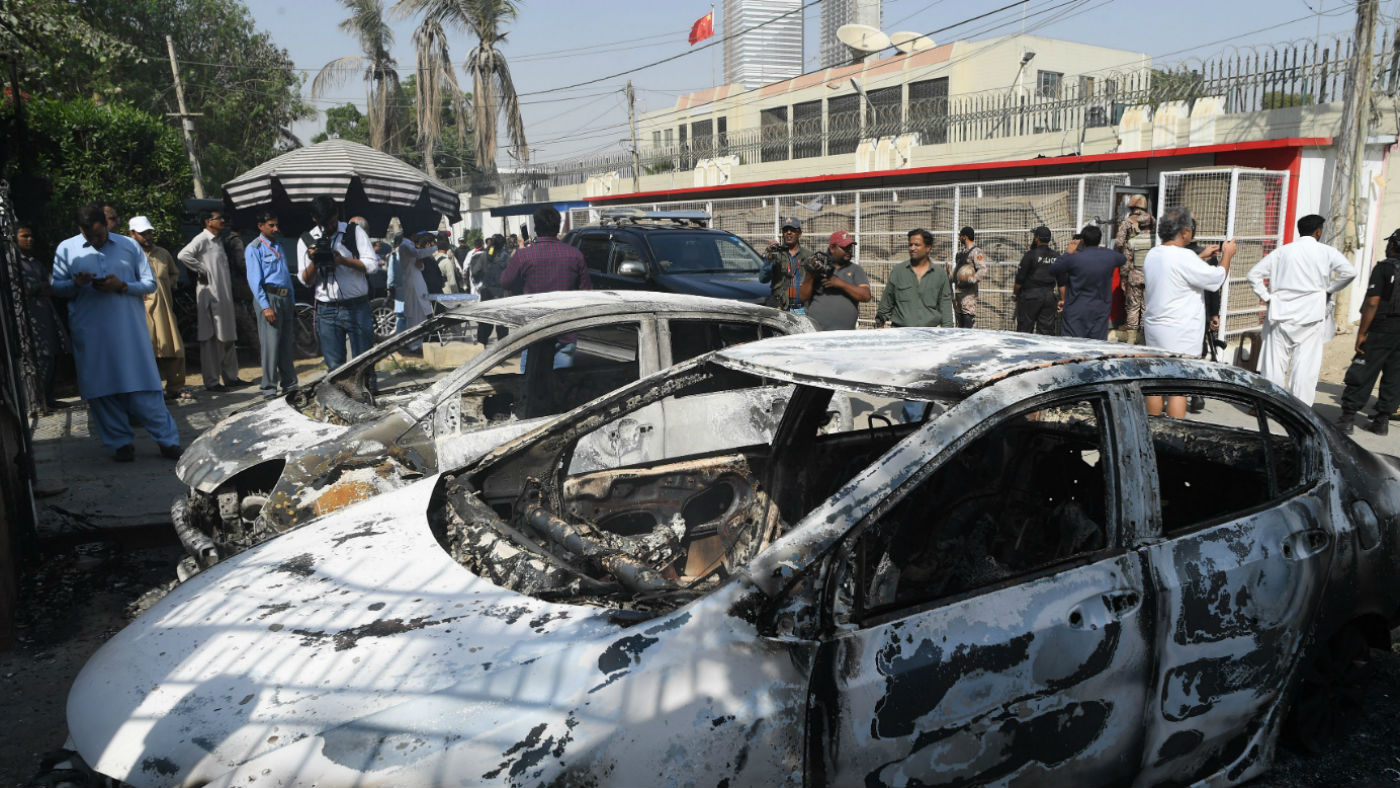Why Pakistani militants are turning on China
Insurgent group says attack on Chinese consulate in Karachi is warning to Beijing

A free daily email with the biggest news stories of the day – and the best features from TheWeek.com
You are now subscribed
Your newsletter sign-up was successful
An armed attack on the Chinese consulate in the Pakistani city of Karachi has put tensions over Beijing’s expansionist foreign policy in the spotlight.
Three suicide bombers killed two policemen and a Pakistani father and son applying for visas during the attempted raid on Friday morning, according to reports in local media. Police said the three attackers were killed before they were able to penetrate the compound.
No Chinese citizens were harmed in the attack. Pakistani Prime Minister Imran Khan has vowed to launch a “complete inquiry” into the incident, which he suggested was “part of a conspiracy aimed at undermining economic and strategic cooperation between the two nations”, Reuters reports.
The Week
Escape your echo chamber. Get the facts behind the news, plus analysis from multiple perspectives.

Sign up for The Week's Free Newsletters
From our morning news briefing to a weekly Good News Newsletter, get the best of The Week delivered directly to your inbox.
From our morning news briefing to a weekly Good News Newsletter, get the best of The Week delivered directly to your inbox.
As the news site notes, China “is Pakistan’s closest ally, ploughing billions of dollars in loans and infrastructure investments into the South Asian nation as part of Beijing’s vast Belt and Road initiative”.
That investment is critical for Pakistan’s ailing economy. Earlier this week, bailout talks with the International Monetary Fund (IMF) broke down, with the US-led organisation unconvinced that Islamabad had taken sufficient steps to control the country’s fiscal deficit, says the Nikkei Asian Review.
However, not all Pakistanis welcome China’s growing involvement in the country. The attempted storming of the Karachi consulate appears to have been the work of the Baloch Liberation Army (BLA), a separatist insurgent group believed to be responsible for multiple acts of terror against the Pakistani state.
In a statement to Reuters, the BLA said it had ordered the assault because “China is exploiting our resources”.
A free daily email with the biggest news stories of the day – and the best features from TheWeek.com
The miliants’ main political objective is to establish an independent homeland for the ten million-strong Baloch ethnic group, around half of whom live in Pakistan’s southwestern province of Balochistan.
However, in recent years the group has also turned its attention to Chinese-funded construction projects in the province.
Balochistan “has rich mineral and natural gas reserves but remains Pakistan’s poorest province”, making Chinese encroachment in the region a delicate subject, says CNBC.
In August, a BLA suicide bomber blew up a van packed with explosives alongside a bus transporting Chinese engineers to a mining site near the provincial capital of Quetta, injuring six passengers.
The group’s spokesman said the attack on the consulate was intended as a warning to Beijing that “we will not tolerate any Chinese military expansionist endeavours on Baloch soil”.
China’s embassy in Islamabad has struck a defiant note in response to the attack, insisting that “any attempt to undermine the China-Pakistan relationship is doomed to fail”.
But even in more moderate quarters, China’s growing influence in Pakistan has been a cause for concern.
Part of the reason for the breakdown of the latest bailout talks was “the IMF’s insistence that Pakistan fully disclose the terms of loans extended under China’s Belt and Road Initiative”, the Nikkei Asian Review reports.
Washington has accused Beijing of engaging in “debt-trap diplomacy”, flooding poorer countries in Asia, Africa and Central America with much-needed capital in order to establish Chinese influence.
-
 Why is the Trump administration talking about ‘Western civilization’?
Why is the Trump administration talking about ‘Western civilization’?Talking Points Rubio says Europe, US bonded by religion and ancestry
-
 Quentin Deranque: a student’s death energizes the French far right
Quentin Deranque: a student’s death energizes the French far rightIN THE SPOTLIGHT Reactions to the violent killing of an ultraconservative activist offer a glimpse at the culture wars roiling France ahead of next year’s elections
-
 Secured vs. unsecured loans: how do they differ and which is better?
Secured vs. unsecured loans: how do they differ and which is better?the explainer They are distinguished by the level of risk and the inclusion of collateral
-
 Epstein files topple law CEO, roil UK government
Epstein files topple law CEO, roil UK governmentSpeed Read Peter Mandelson, Britain’s former ambassador to the US, is caught up in the scandal
-
 Iran and US prepare to meet after skirmishes
Iran and US prepare to meet after skirmishesSpeed Read The incident comes amid heightened tensions in the Middle East
-
 Israel retrieves final hostage’s body from Gaza
Israel retrieves final hostage’s body from GazaSpeed Read The 24-year-old police officer was killed during the initial Hamas attack
-
 China’s Xi targets top general in growing purge
China’s Xi targets top general in growing purgeSpeed Read Zhang Youxia is being investigated over ‘grave violations’ of the law
-
 Panama and Canada are negotiating over a crucial copper mine
Panama and Canada are negotiating over a crucial copper mineIn the Spotlight Panama is set to make a final decision on the mine this summer
-
 Why Greenland’s natural resources are nearly impossible to mine
Why Greenland’s natural resources are nearly impossible to mineThe Explainer The country’s natural landscape makes the task extremely difficult
-
 Iran cuts internet as protests escalate
Iran cuts internet as protests escalateSpeed Reada Government buildings across the country have been set on fire
-
 US nabs ‘shadow’ tanker claimed by Russia
US nabs ‘shadow’ tanker claimed by RussiaSpeed Read The ship was one of two vessels seized by the US military